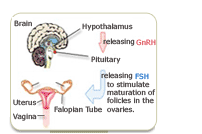34 MENOPAUSE SYMPTOMS |
HEALTH CENTER |
|
| |
|
|
|
|
|
|
Hormone replacement therapy (commonly known as HRT) was the treatment of choice for menopausal symptoms and related diseases for years, until a series of studies showed that HRT poses a host of serious health risks outweighing the therapy's benefits. Today, the controversy continues as the medical community tries to determine the safety of hormone replacement therapy in managing menopause. Keep reading to get all the facts about HRT in order to weigh up the risks associated with this treatment. |
|
During menopause, the body's production of essential sex hormones estrogen, progesterone and testosterone significantly decreases or ceases altogether. Hormone replacement therapy (HRT) refers to the administration of synthetic sex hormones to alleviate the symptoms and health conditions associated with age-related hormonal deficiencies. |
 |
Until recently, HRT was the preferred treatment for women suffering from menopausal symptoms. The initial studies on hormone replacement therapy showed positive results for the relief of common menopausal symptoms, including hot flashes and vaginal dryness, as well as the prevention of common postmenopausal health disorders such as osteoporosis and cardiovascular disease.
HRT may include low levels of only estrogen hormones, or estrogen in combination with progestin hormones (the synthetic form of progesterone). |
|
- Estrogen alone, or "unopposed estrogen therapy," is typically administered to women having undergone hysterectomy (removal of the uterus).
- In women who still have a uterus, progestin is also given in order to prevent the multiplication of uterine lining cells (a condition known as hyperplasia), which may result in uterine cancer.
|
|
Recently, it has become increasingly popular to administer testosterone in conjunction with other hormones in order to improve low libido and help protect against bone loss and osteoporosis.
Hormone replacement therapy exists in a wide variety of forms, according to the intended actions of the treatment. Keep reading to learn more about the different types of HRT.  |
|
|
|
|
Hormone replacement therapy poses several serious health risks which typically outweigh the benefits the treatment may bring. Fortunately, safer, gentler, and equally effective options for alleviating menopausal symptoms do exist. Keep reading to learn more. |
|
|
|
|
Treating Hormonal Imbalance with
MacaActive Supplements |
|
Hormones such as estrogen, progesterone and testosterone play an essential role in several areas of the body, and as hormonal levels decline with age, the health implications can be significant. As women begin to notice the symptoms of hormone deficiency, they may want to consider taking steps to stabilize their hormonal production.
Today, there are three effective ways to normalize hormonal levels: lifestyle changes, alternative medicine and drugs & surgery.
|
|
 |
Lifestyle Changes: Lifestyle changes (such as an improved diet and increased exercise) are vital for overall health and for alleviating the symptoms of hormonal balance, but lifestyle changes alone will not have a significant impact on hormonal production. Most women will want to consider the next level of treatment, alternative medicine, which has proven to be excellent for treating hormonal imbalance in a safe and natural way.
|
|
 |
Alternative medicine: There are two types of herbal supplements for improving low estrogen levels: those containing phytoestrogenic herbs, and those containing non-estrogenic herbs. Phytoestrogenic herbs (like Black Cohosh) are filled with phytoestrogens, which are similar to estrogens. They can increase low estrogen levels by replacing some of the missing estrogen hormones. This isn't the best solution, however, because your body will become less responsive to producing estrogen on its own, causing a further decrease in body-own hormone levels. Unlike phytoestrogenic herbs, non-estrogenic herbs don't contain estrogen, but they nourish the hormonal glands to work more efficiently. This ultimately results in balancing not only estrogen, but other necessary hormones, as well. Using non-estrogenic herbs is one of the safest and best ways to treat hormonal imbalance naturally.
An excellent example of a safe and effective non-estrogenic herb for estrogen deficiency is herbal MacaActive. What makes MacaActive so special is its ability to balance hormonal levels in women by nourishing the hormonal glands. In this way, it alleviates most disorders related to hormonal imbalance.  to read more about MacaActive. to read more about MacaActive.
|
|
 |
Drugs and Surgery: This level of treatment has the highest risk and often the highest cost. The most common drug therapy for treating hot flashes in the US is hormone replacement therapy (HRT). There's no doubt that this is the quickest and strongest way to combat hormonal imbalance. Unfortunately, it entails serious side effects and increases the risk of different types of cancer in women. If you still want to consider this approach, see your doctor to learn more about what this treatment option involves.
|
|
A safe way for balancing hormones:
Non-estrogenic herbs are the most effective solution for treating hormonal deficiency.
MacaActive is an excellent non-estrogenic herb. It's simple: rather than putting hormones from the outside into your body artificially, MacaActive stimulates your hormone glands into producing the necessary hormones naturally. This is what makes MacaActive supplements so unique.  to read all about MacaActive. |
 |
|
 |
|
|
|







